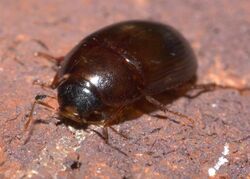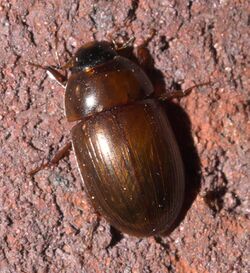Biology:Cymbiodyta bifidus
| Cymbiodyta bifidus | |
|---|---|

| |
| Scientific classification | |
| Domain: | Eukaryota |
| Kingdom: | Animalia |
| Phylum: | Arthropoda |
| Class: | Insecta |
| Order: | Coleoptera |
| Family: | Hydrophilidae |
| Genus: | Cymbiodyta |
| Species: | C. bifidus
|
| Binomial name | |
| Cymbiodyta bifidus (LeConte, 1855)
| |
| Synonyms | |
|
Helocombus bifidus | |
Cymbiodyta bifidus is a species of hydrophilid beetle. The species was formerly the sole member of the genus Helocombus.[1][2][3]
Description
Adult size ranges from 5.5 to 7.8 millimetres (0.22 to 0.31 in) in length. Their maxillary palpi are long and slender with the last segment shorter than the preceding segment and the pseudobasal segment concave inwardly. There is a pyramidal projection medially on the mesosternum, and the elytra have distinct striations. The middle and hind tarsi have four segments, while tarsal claws have a basal tooth in both males and females.[4]
The antennae on larvae have basal segments that are slightly shorter of subequal to the remaining segments, with sensorium on the apex of segment 2. The labroclypeus has several smaller central teeth and two larger teeth on each side. The mandibles are symmetrical, and both have two inner teeth. Larvae also have well developed legs, and the ligula is subequal to the length of the first palpal segment.[4]
Distribution
Cymbiodyta bifidus ranges across much of eastern North America from Labrador south to central Florida and west to the Great Plains. It has been collected from pond and lake habitats containing emergent vegetation, such as sedges, as well as in slow moving streams.[4][5][6]
References
- ↑ Toussaint, Emmanuel F. A.; Short, Andrew E. Z. (2019). "Historical Biogeography of Holarctic Cymbiodyta Water Scavenger Beetles in the Times of Cenozoic Land Bridge Dispersal Routes". Insect Systematics and Diversity 3 (5). doi:10.1093/isd/ixz017. https://academic.oup.com/isd/article-abstract/3/5/8/5585918.
- ↑ "Helocombus bifidus (LeConte, 1855)". Integrated Taxonomic Information System. https://www.itis.gov/servlet/SingleRpt/SingleRpt?search_topic=TSN&search_value=113149. Retrieved July 28, 2015.
- ↑ Short, Andrew E.Z.; Fikåček, Martin (2011). "World catalogue of the Hydrophiloidea (Coleoptera): additions and corrections II (2006-1010)". Acta Entomologica Musei Nationalis Pragae 51 (1): 83–122. Archived from the original on August 13, 2015. https://web.archive.org/web/20150813161822/http://cercyon.eu/Publications_PDF/ShortFikacek_CatalogueUpdateII.pdf.
- ↑ 4.0 4.1 4.2 Epler, John H. (2010). The Water Beetles of Florida. Florida Department of Environmental Protection. http://publicfiles.dep.state.fl.us/dear/labs/biology/biokeys/beetles10.pdf.
- ↑ Whiteman, Noah; Sites, Robert W. (2001). "Aquatic Poyphaga (Coleoptera) state records from the Missouri Prairie Region". Journal of the Kansas Entomological Society 74 (2): 101–105. Archived from the original on March 5, 2016. https://web.archive.org/web/20160305030447/http://www.noahwhiteman.org/uploads/7/1/3/1/7131048/whitemansitesjkes.pdf.
- ↑ Fairchild, G. Winfield; Cruz, Jason; Faulds, Ann M. (2003). "Microhabitat and landscape influences on aquatic beetle assemblages in a cluster of temporary and permanent ponds". Journal of the North American Benthological Society 22 (2): 224–240. doi:10.2307/1467994. Archived from the original on July 28, 2015. https://www.webcitation.org/6aMlGPd5g?url=http://waterbeetles.kubiodiversityinstitute.org/ShortPDFs/Fairchildetal2003.pdf.
Wikidata ☰ Q14931096 entry
 |


